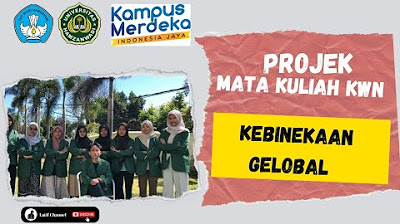Culture Shock di Malang !?
Summary
TLDRThe podcast features two university students discussing their experiences and cultural shocks as newcomers in Malang. They share humorous stories about language differences, like how certain words for everyday objects vary from their hometowns, and unexpected surprises with food, such as the color and taste of dishes like fried rice. The hosts also touch on adapting to local customs, providing tips on how to navigate cultural differences. Overall, it's a light-hearted and relatable conversation for listeners who may have had similar experiences adjusting to new places.
Takeaways
- 🎙️ The podcast involves hosts sharing funny student life stories and experiences.
- 📅 The hosts mention that they're halfway through the semester and reflect on their time in college, including experiences of moving to Malang.
- 🌍 One host shares their experience of moving from Sumatra to Malang, pointing out cultural differences.
- 🛒 The hosts discuss some of the local terminology differences they encountered, like how 'sikat' is used for 'brush' in Malang versus 'bros' in their hometown.
- 🍽️ One host shares their culture shock about how food is prepared in Malang, like the color and taste of fried rice (nasi goreng) being different.
- 🌶️ The hosts also note that food in Malang tends to be sweeter, unlike the salty or spicy flavors they are used to from their regions.
- 🚲 They mention funny misunderstandings around local terms, like confusing 'kontak' (motorbike key) with 'kontak person' (contact person).
- 🍢 One guest mentions how in Malang, they call street vendors 'Mas' instead of 'Bang', reflecting local customs of addressing people.
- 🥡 A tip for newcomers to Malang: Bring your own spices or seasonings if you prefer salty or spicy food, as the local cuisine is milder and sweeter.
- 🧠 The hosts stress the importance of mental preparation, openness, and adaptability when adjusting to new cultural environments, especially in Malang.
Q & A
What is the main theme of the podcast episode?
-The main theme of the podcast episode is cultural shock experienced by students from different regions in Indonesia, particularly in Malang, as they encounter differences in language, food, and daily interactions.
How do the hosts describe the cultural differences in language when moving to Malang?
-The hosts describe how certain words used in their regions are not understood in Malang. For example, one host asked for a 'bros' (which means a brooch in her region), but the shopkeeper was confused because in Malang, a 'bros' refers to a hairbrush. Another example is the word 'hectter,' which means a stapler in her region, but was unfamiliar to people in Malang.
What is one of the major differences in food mentioned by the hosts?
-One of the hosts mentioned that in Malang, the nasi goreng (fried rice) is red due to the use of tomato sauce, whereas in her hometown, it's typically brown or white because it’s made with soy sauce instead of tomato sauce.
How did one of the hosts react to the difference in the color of nasi goreng in Malang?
-One host was surprised by the red color of the nasi goreng in Malang and initially doubted whether it would taste good, wondering if it would be spicy or salty. Upon tasting it, she found it to be sweeter, likely due to the tomato sauce.
What was the experience of another host with finding gorengan (fried snacks) in Malang?
-One of the hosts, who was from Bekasi, was surprised by the lack of gorengan vendors in Malang, especially during Ramadan. In her hometown, there would be many gorengan stalls on the streets, but in Malang, she found mostly sweet snacks instead of the salty fried snacks she was used to.
How does the use of 'Bang' and 'Mas' differ between the hosts' regions and Malang?
-In their hometowns, the hosts would use 'Bang' to address vendors or service people, but in Malang, people use 'Mas' instead. One host shared an experience where she called a vendor 'Bang' and received a confused response until her friend corrected her by using 'Mas.'
What tips do the hosts offer to students experiencing cultural shock in Malang?
-The hosts suggest bringing food items from home to accommodate different taste preferences, such as stocking up on chili sauce or salty seasonings. They also recommend being open-minded and mentally prepared to adapt to the cultural differences in language and behavior.
How do the hosts view the cultural differences they encounter?
-The hosts see the cultural differences as learning opportunities. They emphasize that while there may be initial surprises or misunderstandings, it's important to focus on the positive aspects of Malang's culture and the hospitality of its people.
What do the hosts say about adjusting to the food in Malang?
-The hosts recommend carrying personal seasonings like sambal or salt, especially for those who prefer spicier or saltier flavors. They note that Malang's cuisine is often sweeter, which may require some adjustment.
What general advice do the hosts give to those moving to a new cultural environment?
-The hosts advise being mentally prepared, open-minded, and willing to learn from the new culture. They encourage adapting to the local way of life, recognizing that it may take time, but it will help them grow and feel more at home.
Outlines

This section is available to paid users only. Please upgrade to access this part.
Upgrade NowMindmap

This section is available to paid users only. Please upgrade to access this part.
Upgrade NowKeywords

This section is available to paid users only. Please upgrade to access this part.
Upgrade NowHighlights

This section is available to paid users only. Please upgrade to access this part.
Upgrade NowTranscripts

This section is available to paid users only. Please upgrade to access this part.
Upgrade NowBrowse More Related Video

Joint Venture Negotiation Between a German Company and China

Welcome remarks

Подкаст для абітурієнтів "Жартома-серйозно". Випуск №1

Apa sih Lembaga Legislatif Mahasiswa DPM/MPM

Mata Kuliah Kewarganegaraan berbasis Projek..(MKWK) #universitashamzanwadi #mkwk #budaya

Problem Based Learning, Teaching Descriptive Text
5.0 / 5 (0 votes)